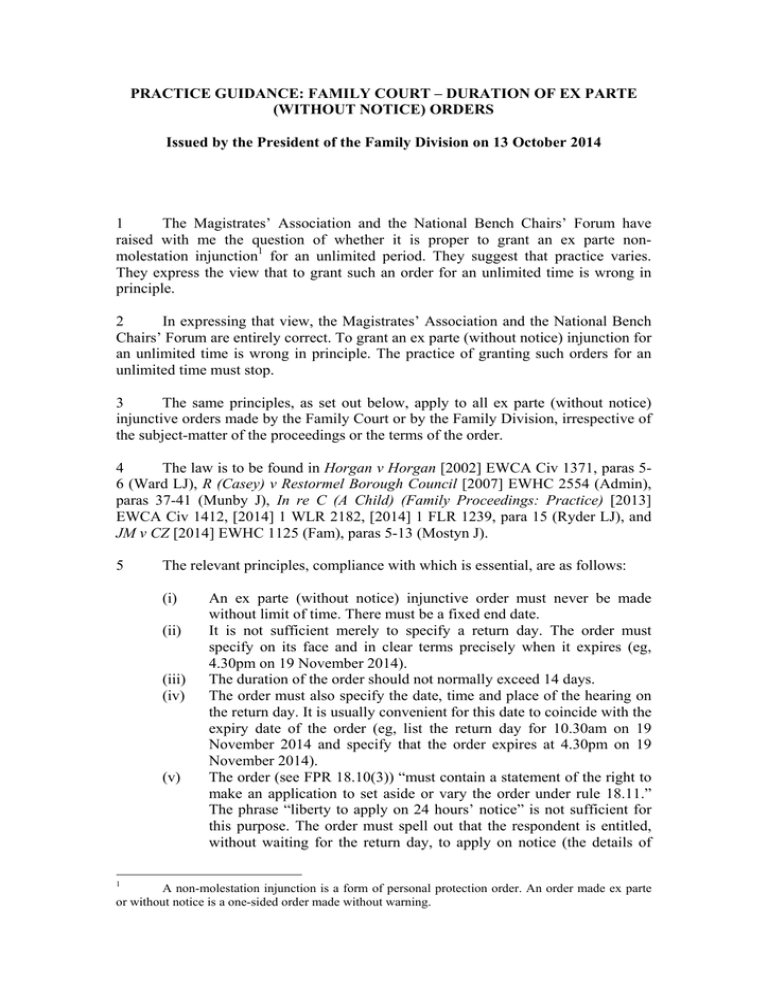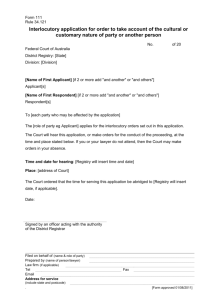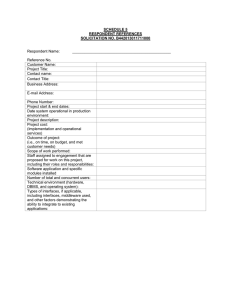Family Court- Duration of ex parte
advertisement

PRACTICE GUIDANCE: FAMILY COURT – DURATION OF EX PARTE (WITHOUT NOTICE) ORDERS Issued by the President of the Family Division on 13 October 2014 1 The Magistrates’ Association and the National Bench Chairs’ Forum have raised with me the question of whether it is proper to grant an ex parte nonmolestation injunction1 for an unlimited period. They suggest that practice varies. They express the view that to grant such an order for an unlimited time is wrong in principle. 2 In expressing that view, the Magistrates’ Association and the National Bench Chairs’ Forum are entirely correct. To grant an ex parte (without notice) injunction for an unlimited time is wrong in principle. The practice of granting such orders for an unlimited time must stop. 3 The same principles, as set out below, apply to all ex parte (without notice) injunctive orders made by the Family Court or by the Family Division, irrespective of the subject-matter of the proceedings or the terms of the order. 4 The law is to be found in Horgan v Horgan [2002] EWCA Civ 1371, paras 56 (Ward LJ), R (Casey) v Restormel Borough Council [2007] EWHC 2554 (Admin), paras 37-41 (Munby J), In re C (A Child) (Family Proceedings: Practice) [2013] EWCA Civ 1412, [2014] 1 WLR 2182, [2014] 1 FLR 1239, para 15 (Ryder LJ), and JM v CZ [2014] EWHC 1125 (Fam), paras 5-13 (Mostyn J). 5 The relevant principles, compliance with which is essential, are as follows: (i) (ii) (iii) (iv) (v) 1 An ex parte (without notice) injunctive order must never be made without limit of time. There must be a fixed end date. It is not sufficient merely to specify a return day. The order must specify on its face and in clear terms precisely when it expires (eg, 4.30pm on 19 November 2014). The duration of the order should not normally exceed 14 days. The order must also specify the date, time and place of the hearing on the return day. It is usually convenient for this date to coincide with the expiry date of the order (eg, list the return day for 10.30am on 19 November 2014 and specify that the order expires at 4.30pm on 19 November 2014). The order (see FPR 18.10(3)) “must contain a statement of the right to make an application to set aside or vary the order under rule 18.11.” The phrase “liberty to apply on 24 hours’ notice” is not sufficient for this purpose. The order must spell out that the respondent is entitled, without waiting for the return day, to apply on notice (the details of A non-molestation injunction is a form of personal protection order. An order made ex parte or without notice is a one-sided order made without warning. (vi) which and the need for which must be set out on the face of the order) to set aside or vary the order. If the respondent does apply to set aside or vary the order the court must list the application as a matter or urgency, within a matter of days at most. 6 Experience suggests that in certain types of case, for example, non-molestation injunctions granted in accordance with Part IV of the Family Law Act 1996, the respondent frequently neither applies to set aside or vary the order nor attends the hearing on the return day. In such cases the court may decide to proceed in the way suggested by Mostyn J in JM v CZ [2014] EWHC 1125 (Fam), para 13: “the return date should be listed, say, 14 days after the initial ex parte order had been made but that the respondent ought to confirm in writing, seven days before the return date, both to the applicant and to the court, whether he in fact wished to attend on the return date and to argue for variation or discharge of the order; and that if the respondent failed to write to the court within that period, it would be open to the applicant to notify the court that the return date should be vacated and to invite the court to extend the injunction as a matter of box work.” 7 Courts must remember that, whether or not the respondent attends on the return day, the respondent does not have to demonstrate that the order should not be extended. In every case the burden remains on the applicant to persuade the court that an ex parte (without notice) order should be extended. 8 To ensure compliance with these principles, it is suggested that the following form of order be used: “1 Paragraph(s) [insert] of this order shall be effective against the respondent [insert names] once it is personally served on [him]/[her] [and/or] once [he]/[she] is made aware of the terms of this order whether by personal service or otherwise. 2 Paragraph(s) [insert] of this order shall last until [insert date and time] unless it is set aside or varied before then by an order of the court. 3 The case is listed for a further hearing in the Family Court sitting at [insert place] on [insert date] (‘the return date’), time estimate: [insert time]. At the hearing on the return date the court will reconsider the application and decide whether the order should continue. If the respondent does not attend on the date and at the time shown the court may make an order in [his]/[her] absence. 4 The respondent has the right to apply to the court at any time, and without waiting until the return date, to set aside or vary this order. [Insert if appropriate: The respondent must give [insert hours/days] [written] notice of the application to the [applicant]/[applicant’s solicitors].] 5 If the respondent intends to rely on any evidence in support of [his]/[her] application to set aside or vary this order, or intends to rely on any evidence to oppose the continuation of the order at the hearing on the return date, the substance of the evidence must be provided in writing to the [applicant]/[applicant’s solicitors] in advance. [Add if appropriate] 6 If the respondent intends to oppose the continuation of the order on the return day [he]/[she] must notify the court [in writing or by email] no later than [insert date and time] that [he]/[she] intends to attend the hearing on the return day and to oppose the continuation of the order. If the respondent does not notify the court then the court may, if appropriate, make an order dispensing with the need for any attendance by the [applicant]/[applicant’s solicitors] on the return day and may, if appropriate, on the return day make an order extending the injunction.” Sir James Munby PFD 13 October 2014


